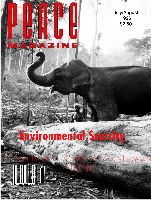
Peace Magazine Jul-Aug 1996, page 4. Some rights reserved.
Search for other articles by PMag staff here
Much of the research and education going on in Canadian universities indirectly supports war-making and social injustice. On the other hand, there is also much work done in peace studies, and in this issue, we are focusing on the latter research. The most influential of these peace projects is a major comparative study led by Thomas Homer-Dixon, which was completed in June. The findings have received considerable public attention. See the articles by Colleen Malone and John Bacher, which review this important work. See also the exciting news item about the new chair of peace studies at the University of Toronto.
In addition to the story by Malone, we present three other papers here that were originally submitted as essays in peace studies courses at Erindale College, University of Toronto. Silvija Jaksic's paper reviews the ongoing problem of landmines - a topic that will not be new to most of our readers, but one that you may have believed to be solved. After all, a ban emerged from the conventional weapons conference this spring, right? Well, not much of one, as you will see. And Derek Smith's article on futuristic weapons is not very reassuring, either. Are you ready for tiny robots that can penetrate your skin or disable your computer?
Sam Alvaro's article is another informative "downer." Sam shows how to build a nuclear weapon all too easily. The only limitation is the inaccessibility of fissile material. Unfortunately, that is not as inaccessible as we may suppose.
And speaking of inaccessible, check out the Bilderbergs, who must be the most elite group to meet in Canada all year. Rosalie Bertell knows who they are but probably none of us can find out what they talked about or how it affects us.
But we have upbeat stories too - especially our profile of Walter Dorn. And we are particularly pleased with Polly Mann's review of Grossman's fascinating book, On Killing.

Peace Magazine Jul-Aug 1996, page 4. Some rights reserved.
Search for other articles by PMag staff here